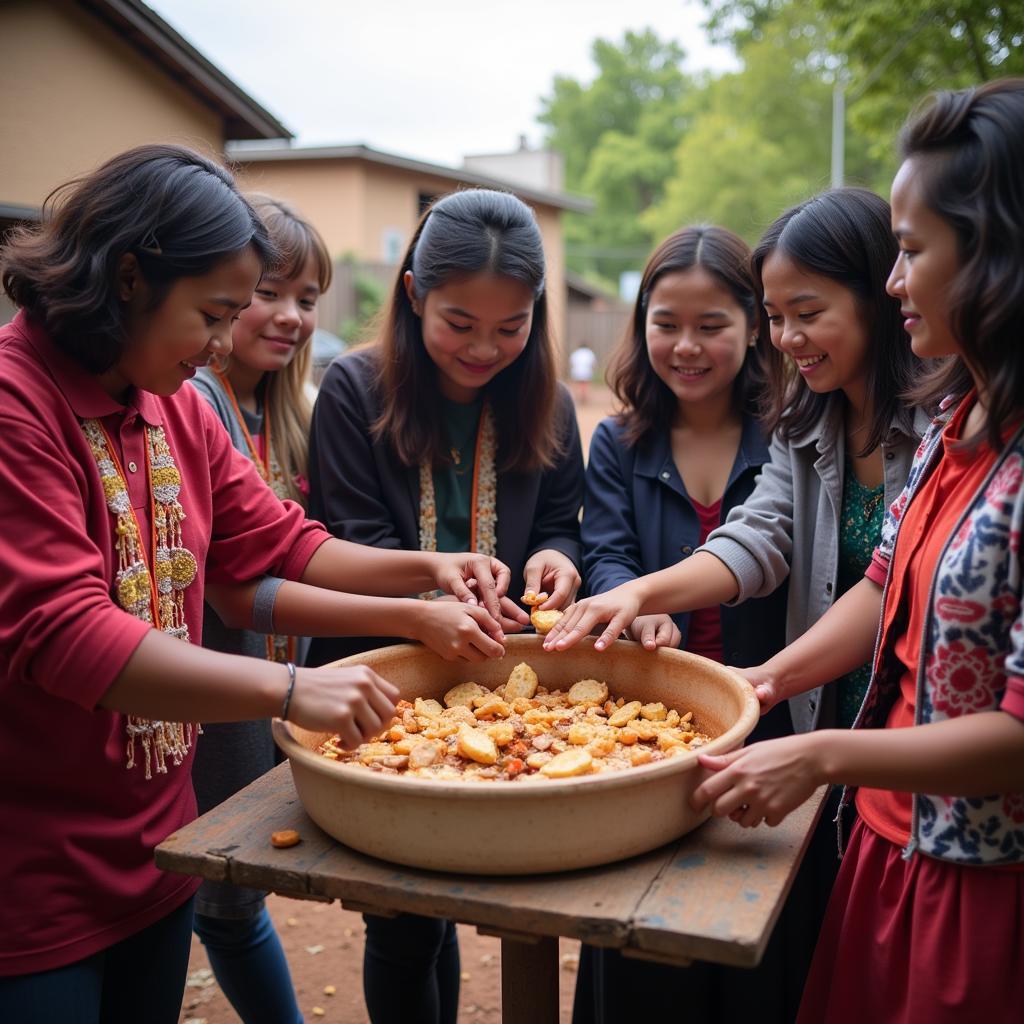Ethnos And Society are intrinsically linked, shaping each other in profound ways. This relationship influences everything from cultural norms and values to social structures and political systems. Understanding this interplay is crucial for fostering tolerance, promoting peaceful coexistence, and building a more inclusive global community.
Exploring the Concept of Ethnos
Ethnos refers to a group of people who share a common culture, history, and often, a sense of shared descent. This shared identity can be based on various factors such as language, religion, traditions, customs, and even physical characteristics. It’s important to note that ethnos is not static; it evolves over time, influenced by both internal and external factors. The concept of ethnos is complex and multifaceted, encompassing both objective and subjective elements. It’s not solely about shared ancestry or genetic makeup; it’s also about the shared narratives, beliefs, and practices that bind a group together. This sense of belonging provides a framework for understanding the world and one’s place within it.
How Ethnos Influences Societal Structures
The influence of ethnos on societal structures is undeniable. Shared cultural values and norms shape social interactions, institutions, and even legal systems. For instance, the importance placed on family ties in some cultures can influence social welfare policies, while religious beliefs can impact laws related to marriage and personal conduct. Understanding these connections is essential for navigating intercultural interactions and building bridges between different communities. The values and beliefs of an ethnos can significantly impact how society is organized and functions. For example, a culture that prioritizes collectivism may have different social structures compared to a culture that emphasizes individualism. This can manifest in everything from economic systems to political organization.
 Ethnos influencing societal structures
Ethnos influencing societal structures
Society’s Impact on Ethnos: A Reciprocal Relationship
The relationship between ethnos and society is not a one-way street. Just as ethnos shapes society, society also influences the evolution of ethnos. Social, political, and economic changes can lead to shifts in cultural values, traditions, and even the sense of shared identity. Globalization, for example, has led to increased cultural exchange and hybridization, blurring the lines between different ethnos and creating new forms of cultural expression. Understanding this dynamic interplay is key to navigating the complexities of our interconnected world.
Adapting to Change: Ethnos in a Dynamic World
In today’s rapidly changing world, ethnos are constantly adapting to new circumstances and influences. Migration, technological advancements, and globalization all contribute to the evolution of cultural identities. This process of adaptation can sometimes lead to tensions and conflicts, but it can also foster creativity, innovation, and a richer understanding of human diversity. The ability of an ethnos to adapt and evolve is essential for its survival and continued relevance in a dynamic world. This adaptability can be seen in the way cultures incorporate new technologies, adapt to changing economic conditions, and navigate the challenges of globalization.
Bridging the Divide: Fostering Understanding and Peace
Understanding the complex relationship between ethnos and society is crucial for building a more peaceful and inclusive world. By recognizing and respecting the diversity of human cultures, we can break down barriers, promote dialogue, and create a sense of shared humanity. Education, intercultural exchange, and open communication are essential tools for fostering understanding and building bridges between different communities.
The Role of Communication in Inter-Ethnic Harmony
Effective communication plays a vital role in promoting harmony between different ethnos. By fostering open dialogue and respectful communication, we can address misunderstandings, build trust, and create a space for meaningful interaction. Learning about different cultures, languages, and perspectives can help us appreciate the richness of human experience and build stronger relationships across cultural boundaries. This requires active listening, empathy, and a willingness to engage with different viewpoints.
Conclusion
Ethnos and society are intertwined, shaping each other in a continuous cycle of influence. Understanding this dynamic relationship is crucial for promoting peace, tolerance, and understanding in our increasingly diverse world. By embracing our shared humanity and celebrating the richness of cultural expression, we can build a more just and equitable future for all.
FAQ
- What is the difference between ethnos and ethnicity?
- How does globalization affect ethnos?
- What are some examples of how ethnos influences society?
- How can we promote understanding between different ethnos?
- What is the role of education in fostering intercultural harmony?
- How can technology be used to bridge cultural divides?
- What are the challenges of maintaining cultural identity in a globalized world?
Scenarios:
- Scenario 1: A new immigrant family is struggling to integrate into a new society. They face language barriers, cultural differences, and discrimination. How can understanding the concept of ethnos and its interaction with society help them navigate these challenges?
- Scenario 2: Two different ethnic groups within a country have a history of conflict. How can promoting intercultural dialogue and understanding help to build peace and reconciliation?
Further Exploration:
- Explore other articles on our website related to cultural diversity and social cohesion.
- Learn more about conflict resolution and peacebuilding initiatives around the world.
Call to Action:
For support, contact us at Phone: 02043854663, Email: [email protected] or visit our office at Khu 34, Bac Giang, 260000, Vietnam. Our customer service team is available 24/7.